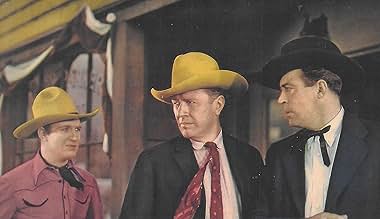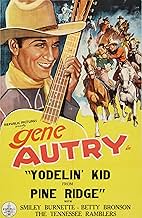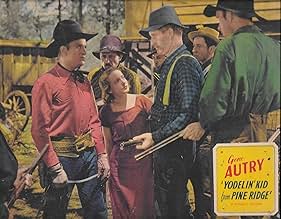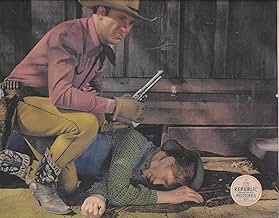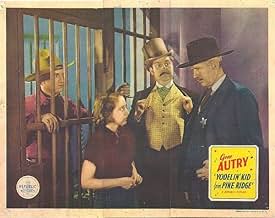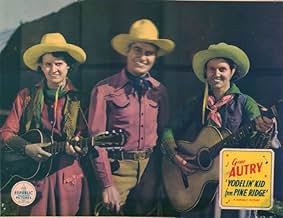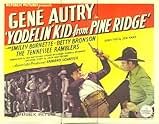Die alte Kriegsgeschichte der West Range wurde nach Georgia transportiert, mit Autry als Held.Die alte Kriegsgeschichte der West Range wurde nach Georgia transportiert, mit Autry als Held.Die alte Kriegsgeschichte der West Range wurde nach Georgia transportiert, mit Autry als Held.
LeRoy Mason
- Len Parker
- (as Le Roy Mason)
The Tennessee Ramblers
- Comic Musicians
- (as Tennessee Ramblers)
Fred 'Snowflake' Toones
- Sam
- (as Snowflake)
Chris Allen
- Rodeo Spectator
- (Nicht genannt)
W.J. Blair
- Member, The Tennessee Ramblers
- (Nicht genannt)
Charles Brinley
- Cattleman
- (Nicht genannt)
Buck Bucko
- Cowhand
- (Nicht genannt)
Empfohlene Bewertungen
This entry is on everyone's must-see list because it co-stars the legendary Betty Bronson. Betty had actually retired from movie-making in 1932, and after this "comeback", she didn't make another movie until A Pocketful of Miracles in 1961. Betty is absolutely lovely here and it's a thrill to see what a fine pair Gene and Betty make in this really top-notch script that helps to make it (as far as I'm concerned) one of Gene's top five pictures. Other assets include a fine support cast led by Smiley Burnette (who excels in what amounts to a character role), LeRoy Mason (a well-spoken heavy), Charles Middleton (Gene's dull-witted dad), and Russell Simpson (a delight as a really nasty piece of work). Good slots are also provided by Jack Dougherty (the heavy's partner in crime), Henry Hall (the sheriff), Jack Ingram and even Art Mix. Mr Toones, on the other hand, has – thankfully! – but one brief moment.
Despite its somewhat off-putting title, this entry shapes up as one of Gene's most vibrant and exciting. Even Joseph Kane, normally a rather humdrum director, seems to have realized the movie's potential and pulled out all stops to make it as thrilling as possible. Production values are great. (If you're quick, you can plainly spot Kane in a rare on screen appearance as one of the turpentiners. As far as I know he actually faced the camera only five times in his lengthy directorial and editing career).
Please note that while the Platinum Disc print is of good quality, it's mastered from the TV cut-down that's missing six minutes of essential footage, including the opening scenes of the street parade, other bits and pieces here and there, and the entire episode where Gene rides away from his home ranch after being dismissed by his dad, encounters Betty who asks him when he's coming back. Gene tells her that he doesn't know. A tearful Betty promises to wait for his return.
Despite its somewhat off-putting title, this entry shapes up as one of Gene's most vibrant and exciting. Even Joseph Kane, normally a rather humdrum director, seems to have realized the movie's potential and pulled out all stops to make it as thrilling as possible. Production values are great. (If you're quick, you can plainly spot Kane in a rare on screen appearance as one of the turpentiners. As far as I know he actually faced the camera only five times in his lengthy directorial and editing career).
Please note that while the Platinum Disc print is of good quality, it's mastered from the TV cut-down that's missing six minutes of essential footage, including the opening scenes of the street parade, other bits and pieces here and there, and the entire episode where Gene rides away from his home ranch after being dismissed by his dad, encounters Betty who asks him when he's coming back. Gene tells her that he doesn't know. A tearful Betty promises to wait for his return.
The film begins around the Georgia/Florida border. Ranchers and the 'Turpentines' (local hill people) are at odds with each other. In the middle is Gene Autry—who tries to get both sides to see reason and avoid an all out war. Unfortunately, he ends up ticking off both sides and Gene's father disowns him. As for Gene, he lands on his feet—becoming a rodeo champ and singing sensation. When he returns home after a few years, things have NOT improved but have become a lot worse. So, it's up to our star to find out who's behind the fight—who is stirring up BOTH sides as well as why.
The idea of setting a Gene Autry movie in the Georgia/Florida region was very good—a nice change of pace. After all, back in the 1930s (and even today) northern Florida is home to many ranches and horses are very common there. However, and this is a BIG however, the film looked exactly like any other Gene Autry film—with cowboys, dusty trails and even a canyon—yet there are no canyons in Florida or Georgia and they are also not dusty/desert locales. In fact, they have TONS of rain, foliage, palm trees and the like—none of which you see in "Yodelin' Kid from Pine Ridge"! It's obviously just another California back lot production and the filmmakers took no efforts to even try to make it look like the film was set in the East. To me, this was incredibly lazy and brings up a major problem with many B-westerns—they were produced so quickly that shabby mistakes are too common.
Another problem in the film is the singing. While Autry always had a very nice voice, one of the other singing groups (the ladies who sing at about 34 minutes into the film) are just terrible—and I found myself speeding past their performance. Autry's yodeling, while unpleasant, was at least quite skilled.
All in all, a very disappointing film with little to recommend it. After all, who wants to see a 'western' set in the East Coast where none of this clearly took place?!
The idea of setting a Gene Autry movie in the Georgia/Florida region was very good—a nice change of pace. After all, back in the 1930s (and even today) northern Florida is home to many ranches and horses are very common there. However, and this is a BIG however, the film looked exactly like any other Gene Autry film—with cowboys, dusty trails and even a canyon—yet there are no canyons in Florida or Georgia and they are also not dusty/desert locales. In fact, they have TONS of rain, foliage, palm trees and the like—none of which you see in "Yodelin' Kid from Pine Ridge"! It's obviously just another California back lot production and the filmmakers took no efforts to even try to make it look like the film was set in the East. To me, this was incredibly lazy and brings up a major problem with many B-westerns—they were produced so quickly that shabby mistakes are too common.
Another problem in the film is the singing. While Autry always had a very nice voice, one of the other singing groups (the ladies who sing at about 34 minutes into the film) are just terrible—and I found myself speeding past their performance. Autry's yodeling, while unpleasant, was at least quite skilled.
All in all, a very disappointing film with little to recommend it. After all, who wants to see a 'western' set in the East Coast where none of this clearly took place?!
One reviewer on here said he "couldn't find a single yodel" in "Yodelin' Kid from Pine Ridge". He must have gone to the popcorn stand, or the restroom, just as the movie started, as Gene yodels the first few bars of the theme song over the credits of the movie. Yes, he did yodel, in a number of his early recordings. And yes, so did Roy Rogers. But my opinion is that Gene's yodeling was superior to Rogers'.
Gene Autry started making records in the late 1920s, and many of his early records were his versions of records made earlier by Jimmy Rodgers, who was famous for his yodeling. That's where Gene learned how to yodel.
Gene Autry started making records in the late 1920s, and many of his early records were his versions of records made earlier by Jimmy Rodgers, who was famous for his yodeling. That's where Gene learned how to yodel.
Excellent storyline. Beautifully upscale sets. Nice direction and marvelous character actors. Plus Autry gets the most interesting girl he's been paired with in his movies! Thank goodness we didn't have to see him in Africa again!!!!
Beats me why The Western Channel only rated this entry a 1 out of 4. It's easily one of Gene's best. Great mix of hard riding, fast shooting, big cast, and scenic location, plus Gene's way with a song. And get a load of that jug band. They could make music with a bathtub. Gene's trying to bring peace between cattlemen and turpentiners, all the while baddie LeRoy Mason is rustling and blaming it on the turpentiners. Got to admit this is first time I've seen turpentine trees involved in a plot, but it is a change from the standard formula. Look for some good stunt work, plus the grinning aside that the cowboys are just shooting blanks—a joke that I guess stayed in. Looks like one trip-wire episode with a horse going suddenly head over heels-- I hope I'm wrong. Anyhow, Frog gets to cut-up, this time as an impresario of a big time pageant show! And with a moustache, no less. All in all, a fine Autry mix, thanks to Republic. Next time The Western Channel ought to watch a movie before rating it.
A "9" on the matinée scale.
A "9" on the matinée scale.
Wusstest du schon
- Zitate
Col. Millhouse: Marvelous, Autry, marvelous! You certainly have that animal trained and I don't see how you do it. What's the secret?
Gene Autry: The secret in training a horse, Colonel, is that, ah, you have to know more than the horse!
- VerbindungenEdited from Annie Oakley (1935)
Top-Auswahl
Melde dich zum Bewerten an und greife auf die Watchlist für personalisierte Empfehlungen zu.
Details
- Laufzeit1 Stunde
- Farbe
- Seitenverhältnis
- 1.37 : 1
Zu dieser Seite beitragen
Bearbeitung vorschlagen oder fehlenden Inhalt hinzufügen

Oberste Lücke
By what name was Yodelin' Kid from Pine Ridge (1937) officially released in India in English?
Antwort
